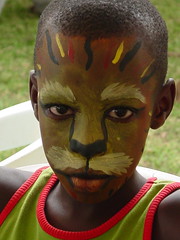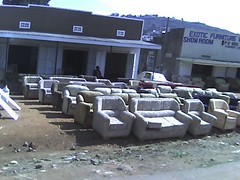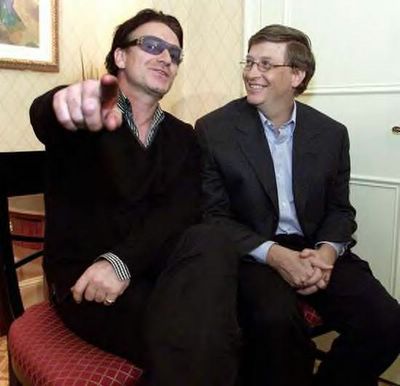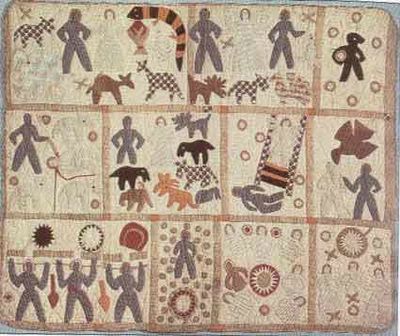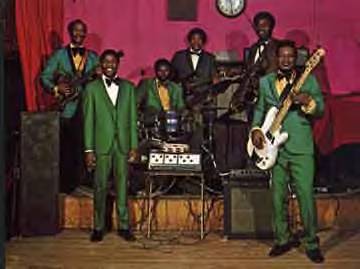

Malaria
One of the good things I've discovered about doing a blog is that I notice other blogs with much greater interest. Strange, I find the same thing with gardens. My garden is weedy, but just trying to garden makes me so very interested to see what other people's gardens are like. Many people don't feel they have the time to pay attention to blogs. That maybe especially true in developing countries where people are paying by the minute. Yet the number of Chinese blogs is really exploding, so it also could just be just be a matter of time. In any case, I encourage people to start their own blogs.
At Nathan's blog earlier in the month he wrote this post:
Malaria Puts me downI didn't comment, but I think about malaria a lot. What really excites me are small steps that ordinary people can take to deal with big problems. But I also see the necessity of ambitious programs for big problems too. Of course most people feel it's only worth arguing over the big stuff, so I can't get around the controversies.
Malaria is becoming my biggest problem. My body temperatures rise time to time. My legs pain whenever I go to sleep and I become week but I do fear to take resistant tabulates. Is there any one with another solution for treating it other than tabulates or injections? Malaria
Jeffery Sachs writes:
On disease, malaria could be controlled by 2008 using proven, low-cost methods. But, again, Africa cannot afford them. The first goal should be to distribute long-lasting insecticide-treated bed nets to all of Africa’s rural poor within four years. The best estimates show that Africa needs about 300 million bed nets, and that the cost per net (including shipping) is around $10, for a sum of $3 billion. This cost would be spread over several years. In addition, Africa needs help with anti-malaria medicines, diagnostic equipment, and training of community health workers.There's quite a bit of controversy over the right approach to malaria; whether the investments should be basically as Sachs outlines, or whether the investments should be funneled towards vaccines and medicine. The good news is not that there's agreement about that but the fact of the matter is a little of both is happening. The bad news is that a little probably isn't enough.
I was receptive to the We All Have AIDS campaign. A commentator here made the point that preventing AIDS is an individual's responsibility. And I saw that reaction to the campaign expressed in several other places. It's a good idea that The Global Fund to Fight AIDS Tuberculosis and Malaria links these diseases together. Many developing countries spend 40% of their health budgets on treating malaria. It's an enormous drain on the economies of developing countries and responsible for so much suffering and death. Beginning to cope with malaria will aid the fight against TB and HIV/AIDS.
TB is spread via the air. Drug-resistant strains are widespread. This is an awfully important fact to realise. The spread of HIV is preventable and surely individual responsibility plays an important role in preventing the spread. It's also important that people have access to information and condoms. HIV/AIDS plays a key role in the development of drug-resistant TB. Even without sympathy for people living with HIV/AIDS their treatment is in our interest because without treatment we only hasten the day when untreatable TB is endemic all over the world. TB is a disease where individual responsibility plays no role.
Both my dear Ugandan friends have gotten a lecture from me to use a bed net. Sleeping under a bed net reduces your chances of contracting malaria by about 30%. It reduces the chances even more for children because they tend to be put to bed earlier and so are protected longer during the hours when the female Anophles mosquito feed. When most everyone in an area is sleeping under a bed net the chances of contracting malaria are significantly further reduced. So bed nets are a very important strategy for reducing malaria, but not a "silver bullet." My friends listen politely to me, but I don't think their sleeping under nets.
There are many good points made in the debates about African Aid. I find it odd that there is a tendancy of politically conservative people to delight in bashing the efforts of the rich and famous in this effort, when I as lefty, not normally desposed to applauding the rich am more sympathetic to their efforts.
Earlier this month Donald G. McNeil Jr. at The New York Times wrote a piece the title, The Rich, Sometimes, Are the Best Medicine made my inner lefty groan. John D. Rockefeller began a drive in 1907 to rid the South of hookworm. "Called "the germ of laziness" because it caused anemia and made victims lethargic and dull-witted, hookworm afflicted up to a third of Southerners." At the time many were arguing that the South could only be rid hookworm when it was rid of poverty. Rockefeller's approach was: worm medicine, latrines, and shoes. It worked.
Programs of that scale and simplicity are what's needed to halt the tragedy of malaria. We are foolish to imagine that disease is something that affects others and not ourselves.
I probably won't call my representatives to support funding for initiatives like The Global Fund because a famous rock star tells me to. But I'm happy that Bono leads in the effort to do just that; I'm glad for the attention he brings to the cause. Somewhere in my gut I still harbor negative feelings about John D. Rockefeller, strange legacy memory. Probably seventy-five years from now people will still recall Bill Gates negatively. Still, you've got to give credit where credit's due. It's quite posible to hold a negative opinion of someone at the same time holding a positive one. At least I can in line with: "Create something good." Horray!
Ethan Zuckerman along with the wonderful blog aggregator Blog Africa and Global Voices has created a short Africa Quiz. Take it, I bet you'll score well. Ethan Z also invites people to comment about the quiz and say how well you did--Where does he find the time?
Happy New Year!

